Neil Robinson: It’s Time for Football to Go Vegan
The vegan revolution is spreading far and wide – including in the world of sports, where athletes ranging from boxer David Haye to ultra-marathon runner Rich Roll have been getting on board. 
Ahead of the World Cup, we caught up with someone who paved the way for the latest wave of vegan stars – Neil Robinson, a former Everton player who was the world’s first-ever professional vegan footballer. Neil gave up eating animal products in 1980, at the height of his athletic career, and has been so impressed by the benefits to his fitness and health that he’s now urging the entire England squad to go vegan, too, in order to boost their performance!
Here, he tells us why plant power is the way forward:
What inspired you to go vegan?
My inspiration for becoming vegan was my older brother John. I became a vegetarian in 1970 when I was 13 years old, solely for ethical reasons – John had become a vegetarian a few months earlier. I’d never heard of veganism at this time, but as I got older, veganism appeared on my “radar” but I never researched it, ignorantly believing that there was nothing wrong at all with the cows “happily” giving up their milk for us to consume. Early in 1980, after John again took the lead and became a vegan, I contacted the Vegan Society for more information. On reading the literature, it became so apparent to me that the dairy and egg farming industries were just as cruel to the animals as the meat industry – if not worse because the poor animals’ lives are prolonged in such terribly cramped farm conditions until they are no longer able to provide humans with “food” – and then they’re slaughtered.
Did you notice any benefits to your athletic abilities after going vegan?
It’s difficult to think back that far now (over 34 years ago!) and I was very fit anyway, but I do remember feeling a lot “sharper” in my first vegan pre-season. From then on, my fitness was sustained to the same levels for the remaining 10 years of my professional football career. I think testimony to this is the fact that not ONE manager, coach, or player I played for, or with, ever questioned my fitness or my ability to perform at that level – in fact, I was always one of the top three fittest players at every club I played for. Plant-powered fitness rules!

Clearly vegan food choices are huge now compared to 1980. Back then there wasn’t even any vegan chocolate, or none that tasted any good – and I was a bit of a chocoholic in those days! Of course, we have such a plethora of raw chocolate bars and treat foods now, which are delicious (although I tend not eat much chocolate nowadays because I follow a low-fat vegan diet). With regard to other foods, it’s so much easier now for people to transition from an animal-based diet to a plant-exclusive diet, with a fantastic array of “fake” meats and cheeses available.
What are your favourite sources of protein?
I try not to stress out too much about my protein intake nowadays –I know it’s a vitally important nutrient, but I also think too much can be harmful to the kidneys in the long term. Having said that, I try to get plenty of greens down me, such as kale, spinach, broccoli, also tofu, some hemp now, and quinoa, and I now use Sunwarrior Raw Rice Protein or Garden of Life Organic Raw Protein as a supplement to my training.
Many top athletes –including boxer David Haye, Olympic cyclist Lizzie Armitstead and squash champion James Willstrop –are going vegetarian or vegan. Do you think we’re likely to see more “meat-free athletes” in the future?
Most definitely! Veganism isn’t ever going away –it’s onwards and upwards now! In fact, one of the reasons that I’m doing talks now is to try and reach out to the sporting world to inform them that an animal-based diet for fitness is just based on ignorance and Stone Age thinking. Yes, animal foods are sources of protein, but they’re also a very significant source of things that cause ill health in humans –and athletes certainly aren’t precluded from this! If an athlete doesn’t care to become vegan for ethical reasons, then they need to do it at least for their own health –and a vegan diet can provide all the nutrition an athlete requires to compete at the top level.
What advice would you give to anyone who is curious about going vegan but doesn’t know where to start?
Not to be daunted by it at all because it’s so much easier than people think, providing they do some research –and there’s such great information resources out there now with the advent of the Internet and social media that you shouldn’t go wrong. Veganism isn’t just a diet –it’s an ethical lifestyle based on eating plant-exclusive foods. Most restaurants can provide vegan alternatives from the menu, or if you contact them beforehand, they should be only too willing to offer a vegan alternative of your choice. One website came up with this great slogan:”Go Vegan and Nobody Gets Hurt!” –absolutely perfect! If you’re thinking of going vegan, just keep this slogan fresh in your mind.
*****
Neil has been proactively spreading the vegan message far and wide.Tolearn more, visit his website: ThePeacefulPlanet.org.
And if you feel inspired to give vegan eating a go, why not sign the pledge to try it out for 30 days?



